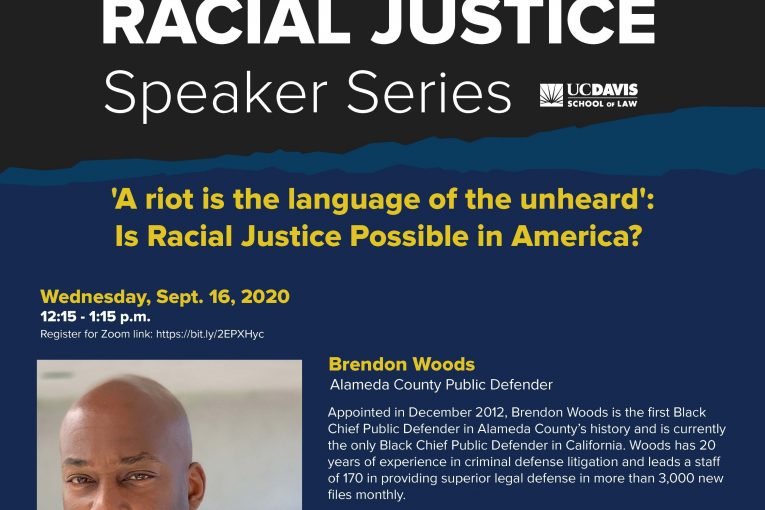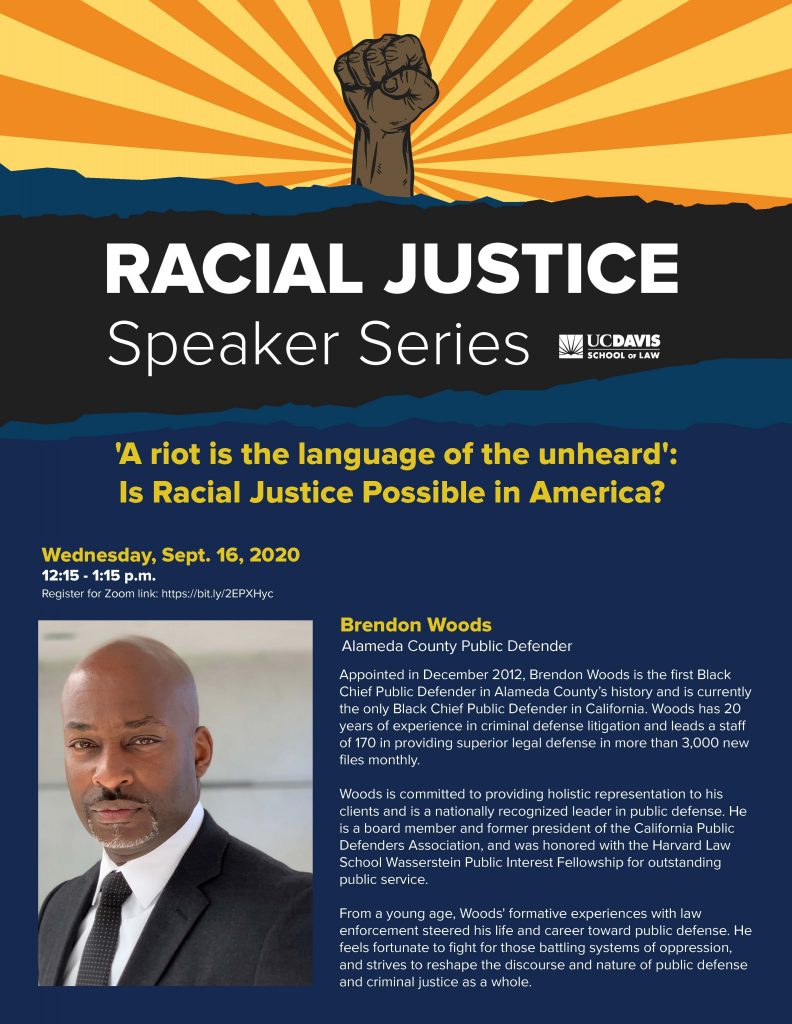

By Anastasia Guevara
DAVIS – To kick off UC Davis School of Law’s Racial Justice Speaker Series, Alameda Public Defender Brendon Woods spoke on Wednesday afternoon, recounting slavery’s dark truths and its lasting effects on American society today.
Woods is the first Black chief public defender in Alameda County’s history and is currently the only Black chief public defender in the state of California.
Woods began his presentation saying, “We have a national pandemic, we have fires ravaging the West Coast, we have storms flooding the East Coast and in the middle of all this, we have what appears to be some sort of national awakening to race and racism in this country. And I say ‘appears to be’ because, still, I am not 100 percent convinced, which leads us to the title of this talk: ‘A riot is the language of the unheard’: Is Racial Justice Possible in America?”
Throughout his lecture, Woods discussed the constant racism in America and quoted figures such as Martin Luther King Jr. and Bryan Stevenson.
“America has failed to hear the voices of Black people in this country for generations. Its failure to recognize is not an accident, but instead, it’s by design.  There is never any sort of true form of reconciliation with Black people in America,” Woods said.
There is never any sort of true form of reconciliation with Black people in America,” Woods said.
Woods pressed that in order to start a conversation about equality and equity, Americans must first start with slavery. He mentioned that the education he received on slavery was woefully inadequate and that it was absolutely intentional.
“Understanding American slavery is vital to understanding racial inequality today,” he said.
Woods described the treatment of slaves in America as atrocious and discussed the Slave Patrols, considered by many to be the first police forces in America. He said white patrolmen would catch and beat Black slaves, laying the foundation of our police force today.
Even after the Thirteenth Amendment was passed in 1865, which abolished slavery and involuntary servitude, things did not get better overnight.
“For 246 years, slavery was legal in America. It wasn’t made illegal until about 155 years ago. America has been a slave society longer than it has not been,” Woods said.
New forms of legally sanctioned terror and control were established, such as the Black Codes, which prohibited Black people from expressing basic rights. Jim Crow laws were adopted, and lynching was frequent.
“Lynching and racial terror profoundly comprised what came to be the criminal justice system,” Woods said. “Just as the Slave Patrols were watching, catching or beating Black enslaved people, modern-day police are watching, arresting, beating, searching and shooting unarmed Black people.”
He related those events from over a century ago to modern-day issues with shootings and discrimination.
“Recent killings have sparked protest like we’ve never seen before, and the pandemic and George Floyd were the catalysts. And we’ve seen protest after protest… and within that, there have been some situations where the protests have turned into looting or riots,” Woods added.
He tied that into a Martin Luther King Jr. quote, for which he named the lecture after, “A riot is the language of the unheard.”
Woods ended his presentation on an inspirational note, “If we can’t have a conversation about why, then we will never be able to achieve racial justice in America. In order to get society to a place where racial justice is possible in America, we have to begin to change that dialogue – we have to learn our history.”
The next installment of the Racial Justice Speaker Series will take place on Sept. 23 from 12:15-1:15 p.m. and will feature speaker Darrell Steinberg.
Those who are interested can visit the Racial Justice Speaker Series website to register.
